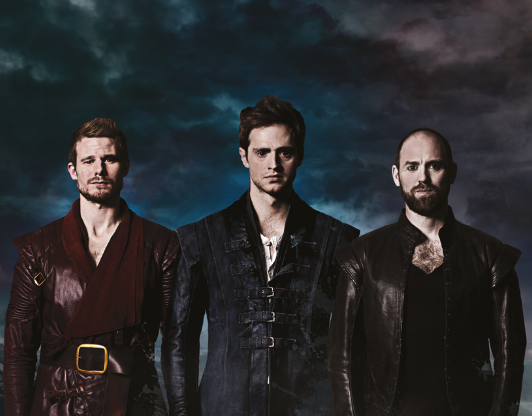
June 13, 2016, by Words on Words
Staging The James Plays in Nottingham
This blog was written by Peter Kirwan, Assistant Professor in Shakespeare & Early Modern Drama
Rona Munro’s trilogy The James Plays is a unique piece of event theatre. Three plays performed by one ensemble of actors, focusing in turn on the reigns of James I, James II and James III of Scotland; staged on an epic scale; touching on the biggest issues of the day: Scottish devolution, European relations, the responsibility of rulers, the rights of the individual. On June 11-12th, the trilogy descended on Nottingham’s Theatre Royal, and the School of English was there to greet it.
‘The James Plays Debates’, a unique collaboration spanning the School’s areas of expertise, marked the significance of The James Plays with three different events catering to the diverse communities invested in the plays. Four academics with different vested interests in the plays – Sarah Grandage (performance and language), Joe Jackson (contemporary Scotland), Peter Kirwan (history plays and event theatre) and Nicola Royan (Scots history and literature) – led the events, drawing together some of the biggest names in Scottish theatre.
The events began with a half-day symposium on June 10th. Taking place in Nottingham’s Great Hall to the somewhat appropriate sound of explosive thunderstorms, two round-table sessions discussed the role of the history play as a genre, the politics of performing Scottish history in England, and the particular achievement of The James Plays. On the first panel, ‘Theatre, Politics and Scotland’, Joe Jackson was joined by Emeritus Professor Brean Hammond, author of the new play Ben and Jamie (2016); the theatre scholar Trish Reid, author of Theatre and Scotland (Palgrave, 2012); and playwright and historian Ian Brown, author of History as Theatrical Metaphor: History, Myth and National Identities in Modern Scottish Drama (Palgrave, 2016). The panel brought their experience to bear on the question of the responsibilities and influences of history plays in relation to questions of education, historical ‘fact’ and contemporary politics.
The second panel, chaired by Sarah Grandage and David Longford of Nottingham Theatre Royal, was entitled ‘Performing History, Performing Scotland’. Joining Sarah and David were Eleanor Rycroft of Bristol University, who was a lead researcher on the Staging and Representing the Scottish Court project in 2013; and Roxana Silbert, artistic director of Birmingham Repertory Theatre, whose many acclaimed stage works include the debut production of David Greig’s history play and Macbeth sequel Dunsinane (2010). This panel considered the work that goes into creating plays rooted in Scottish history for contemporary theatre audiences, as well as contextualising The James Plays within the broader context of modern Scottish history plays.
In the evening of the 10th, the action began shifting to the Theatre Royal as Nicola Royan interviewed Rona Munro herself, with a large local audience getting the opportunity to ask questions of the plays’ author. Rona’s extensive experience as a writer for film and television has culminated here with an opportunity rarely afforded a playwright- the opportunity to write a nine-hour cycle for a large company. Rona discussed her progression from ‘indifferent’ history student to passionate advocate of medieval Scots history; her use of diverse sources; and her intention to go on to the next three James’s in due course.
Finally, on Saturday and Sunday morning, the Nottingham academics ran a ‘breakfast briefing’ for the hardy souls about to spend a long day in the theatre watching the trilogy. Sarah, Joe, Peter and Nicola gave short talks about their own areas of interest in the plays, offering suggestions for how to survive a marathon theatre event and points to watch out for. With Lorne sausage and tattie scones laid on by the Theatre Royal, this was an informal and fun way to kick off two marathon days of theatre.
This was a new kind of collaboration between the University and the Theatre Royal, creating a series of events designed to provide something for everyone from first-time theatregoers to academics, the local Scots community to drama students. We’re grateful to our phenomenal admin team, Becs and Tracy-Ann, for making it happen, and to the National Theatre of Scotland and the Theatre Royal for helping us to mark an extraordinary trilogy which resonated with passions across the School of English. Hopefully it’ll be the first of many such collaborations in the future.
No comments yet, fill out a comment to be the first

Leave a Reply